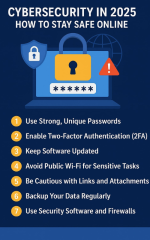Abdul Basit
New member
- Sep
- 1
- 1
As we move deeper into the digital age, cybersecurity in 2025 has become one of the most critical concerns for individuals and organizations alike. Our lives are now fully integrated with the internet — from mobile banking and online shopping to working remotely and managing smart home devices. However, as technology evolves, so do the cyber threats that target it. Staying secure online requires awareness, updated knowledge, and smart digital habits.

Cyber threats have grown in both scale and sophistication. Hackers are no longer lone individuals sitting behind a computer; they now use AI-driven tools, bots, and deepfake technology to deceive users and bypass traditional security systems. Phishing scams are now so realistic that even tech-savvy users can fall victim.
Ransomware remains one of the biggest threats, with cybercriminals encrypting important data and demanding huge payments to unlock it. Another emerging threat in 2025 is data manipulation attacks, where hackers subtly alter data rather than stealing it — causing misinformation and confusion.
Even smart home devices like door cameras, thermostats, and voice assistants can be targeted if they are not properly secured. As the Internet of Things (IoT) expands, each connected device becomes a potential entry point for hackers.
Here are some key steps to strengthen your cybersecurity in 2025:
Technology alone can’t guarantee safety — awareness and behavior matter just as much. Many attacks succeed because users underestimate the importance of cybersecurity. In 2025, being digitally responsible is as vital as locking your home or car.
Stay informed about the latest cyber threats, verify every online transaction, and teach those around you — especially children and older family members — about safe internet practices.
Cybersecurity in 2025 isn’t just a technical requirement — it’s a daily habit. As we continue to rely more on digital tools, our safety depends on vigilance, education, and proactive action. By practicing good cyber hygiene and staying alert, you can enjoy the benefits of a connected world without falling prey to its risks.

The New Era of Cyber Threats
Cyber threats have grown in both scale and sophistication. Hackers are no longer lone individuals sitting behind a computer; they now use AI-driven tools, bots, and deepfake technology to deceive users and bypass traditional security systems. Phishing scams are now so realistic that even tech-savvy users can fall victim.
Ransomware remains one of the biggest threats, with cybercriminals encrypting important data and demanding huge payments to unlock it. Another emerging threat in 2025 is data manipulation attacks, where hackers subtly alter data rather than stealing it — causing misinformation and confusion.
Even smart home devices like door cameras, thermostats, and voice assistants can be targeted if they are not properly secured. As the Internet of Things (IoT) expands, each connected device becomes a potential entry point for hackers.
Practical Ways to Stay Safe Online
Here are some key steps to strengthen your cybersecurity in 2025:
- Use Strong, Unique Passwords
Never reuse the same password across different accounts. Use a reliable password manager to create and store strong, unique passwords. - Enable Two-Factor Authentication (2FA)
This adds an extra layer of security, ensuring that even if your password is stolen, your account remains protected. - Keep Devices and Software Updated
Many cyberattacks exploit outdated software. Regular updates patch known vulnerabilities, keeping your system more secure. - Avoid Public Wi-Fi for Sensitive Transactions
Free Wi-Fi in cafes or airports may be convenient, but it’s often unsecured. Always use a VPN (Virtual Private Network) to protect your data. - Be Wary of Links and Attachments
Cybercriminals use fake emails and messages to trick users into clicking malicious links. Always verify the sender before downloading anything. - Backup Your Data Regularly
Keep backups of important files either on a secure cloud platform or external hard drive. This helps you recover your data if you’re hit by ransomware. - Use Security Software and Firewalls
Reliable antivirus programs and firewalls act as your first line of defense against online attacks.
Cyber Awareness Is the Real Shield
Technology alone can’t guarantee safety — awareness and behavior matter just as much. Many attacks succeed because users underestimate the importance of cybersecurity. In 2025, being digitally responsible is as vital as locking your home or car.
Stay informed about the latest cyber threats, verify every online transaction, and teach those around you — especially children and older family members — about safe internet practices.
Final Thoughts
Cybersecurity in 2025 isn’t just a technical requirement — it’s a daily habit. As we continue to rely more on digital tools, our safety depends on vigilance, education, and proactive action. By practicing good cyber hygiene and staying alert, you can enjoy the benefits of a connected world without falling prey to its risks.